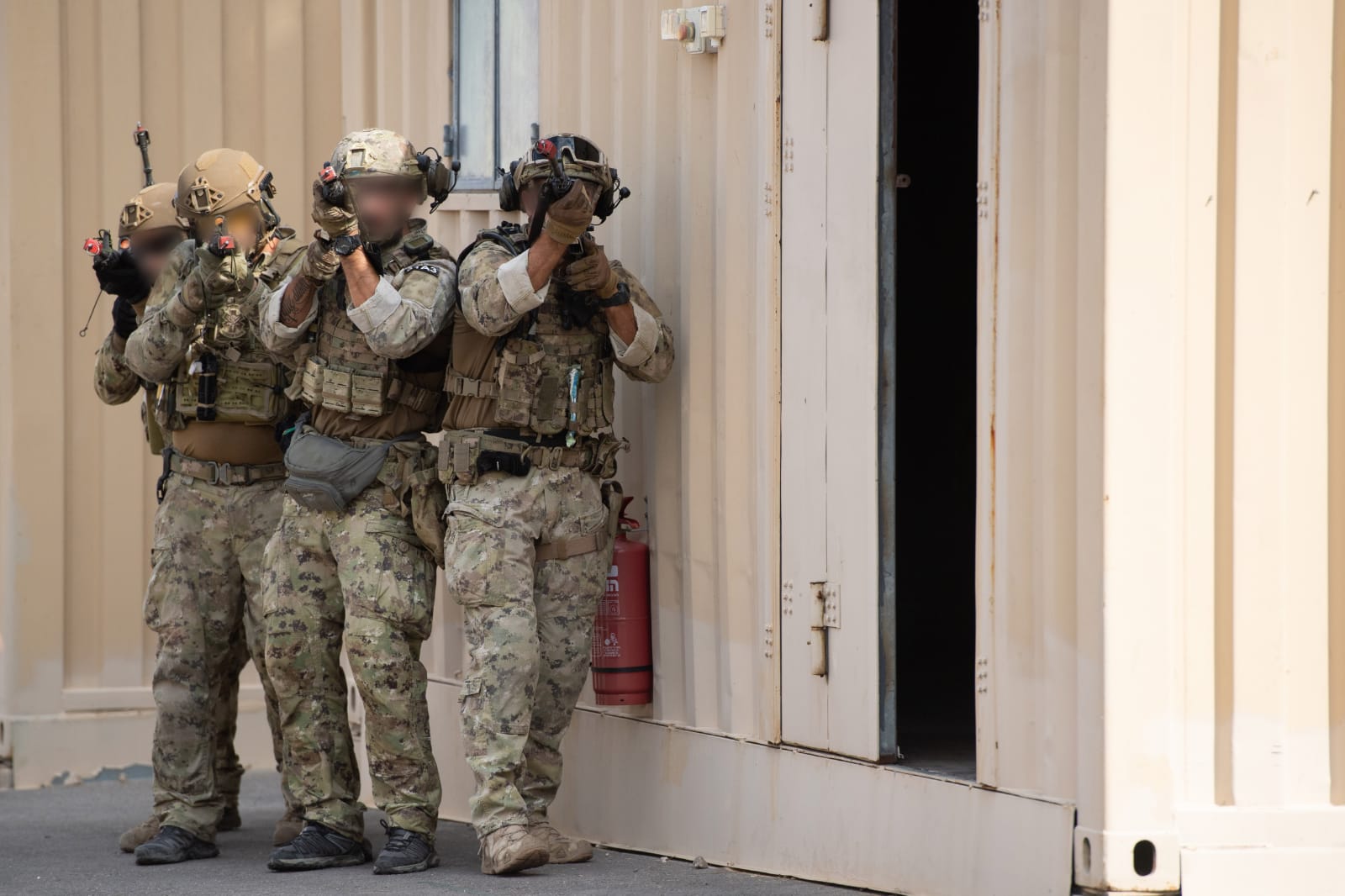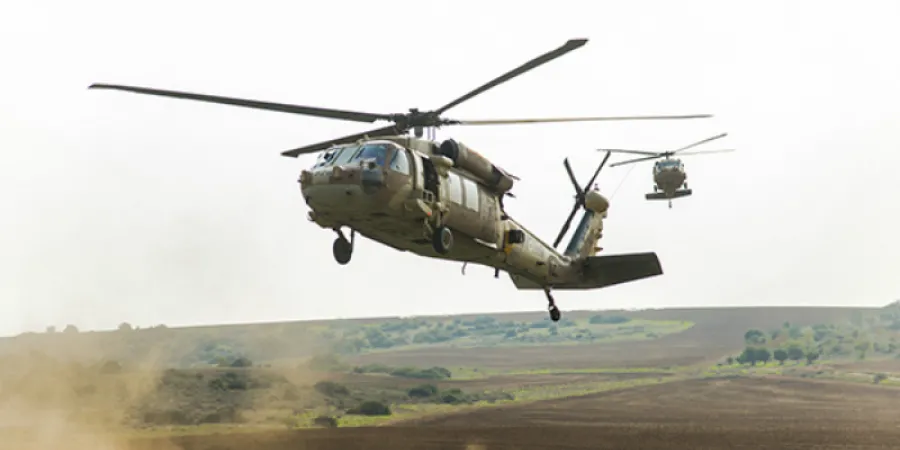Israel Hosts First International SAR Exercise
Dozens of participants from seven countries participated in Sky Angels 2018, one of the biggest Search and Rescue exercises in the world, held for the first time in Israel. Among other scenarios, the forces drilled urban warfare extraction, advanced operational medicine, and mass-casualty incidents
IsraelDefense
| 20/11/2018
The first international SAR (Search and Rescue) exercise held in Israel, led by SAR Unit 669 of the Israeli Air Force, recently concluded. The exercise, dubbed Sky Angels 2018, was participated by representatives from six countries – the United States, Italy, Croatia, the Netherlands, Canada, and the Czech Republic. “The goal of the exercise is to improve the unit's operational knowledge while learning from the experience of other sources,” said Lt. Col. A., Commander of IAF SAR Unit 669. “The unit is responsible for exfiltration and medical evacuation in Israel. It's important for us to learn from SAR units from around the world in order to improve our techniques and modes of training.”
The two-week-long exercise included a week of basic training, followed by a week of mission-oriented drills. “The main topics we drilled were those considered of special importance by SAR Unit 669, such as combat extraction during warfare, urban warfare extraction, advanced operational medicine, mass-casualty incidents and more,” elaborated the unit's commander. An example of a mass-casualty incident faced by the unit occurred last month when SAR Unit 669 operators and IAF Helicopter Division aircrews assisted in the extraction of casualties from a bus which turned over in Jordan.
Various IAF units took part in the exercise alongside SAR Unit 669, including the “Yas'ur” (CH-53) squadrons from Tel-Nof AFB and “Yanshuf” (Black Hawk) squadrons from Palmahim AFB, the 190th (“Magic Touch”) Squadron which operates “Peten” (Apache) attack helicopters, and the 210th (“White Eagle”) Squadron which operates the “Eitan” (Heron TP) RPAV.
SAR Unit 669 has a wide range of operational knowledge, which makes it one of the most experienced and advanced combat extraction units in the world. “As part of the exercise, we delved into topics such as downed pilot search and rescue, survival and assimilation. These are topics in which SAR Unit 669 is a useful source of knowledge.”

Photo: IDF
There are various other advantages in the exercise besides learning from international forces. “I consider the Sky Angels exercise an incredibly significant event for the unit in terms of learning, but the main added value is holding an international exercise with a large number of countries. It is our opportunity to showcase the IAF’s professionalism, advantages and the quality of its service members,” said Lt. Col. A. “It brings me great pride to see Israel host so many countries. Not many countries have held an extraction exercise of this sort and the fact that we have indicates the strength of the IAF and SAR Unit 669 in particular.”
Interpersonal relationships are also a critical factor for future operation. “It was important for me that the unit would learn from international militaries – in exercises, doctrines, and instruction. Mutual discourse is significant in all of them,” added Lt. Col. A. “One of the exercise’s main goals was establishing a good interpersonal infrastructure so that we would be able to consult with our international counterparts when operational dilemmas arise.”
One of the IAF’s main strengths is the debriefing process. This is also visible in the inner workings of SAR Unit 669, which is currently evolving in order to improve its debriefing. Some of the tools at their disposal include GoPro cameras, worn by the operators during every sortie; recording radio communication during operational activity; and use of the helicopters’ debriefing systems. This is considered incredibly interesting by the participating countries and will be heavily emphasized during the exercise.
“It was a high-quality exercise, for all countries involved and for us as a unit as well. Usually, our exercises require a balance between our training and the participating helicopter crews’ training, which means that our time on the ground is usually limited,” shared the unit's commander. “This exercise focuses on extraction. Everyone involved aims to establish the highest-quality extraction exercise possible.”
“Critical Operational Benefits”
Maj. Ivan Delagić, a helicopter pilot from the Croatian Air Force and Head of the Readiness & Evaluation Department, arrived at the exercise as a spectator. “I came to get to know the modes of operation of the IAF, which is similar to our air force. It was interesting seeing how professional and calm the Israeli combatants were in spite of their young age.”
“The role of a SAR operator is based on techniques which continue to renew themselves – you always want to become quicker and better. As a result, learning just one thing from a unit as experienced as SAR Unit 669 makes the whole trip worth it,” shared Lt. Col. Anthony Alexander, a SAR officer from the United States Air Force's 943d Rescue Group. “As a SAR operator, there's a lot to learn and the material is always changing. There are myriad ways to do anything.”
While IAF service members acquired practical knowledge from the exercise’s international participants, Lt. Col. A. said that not all SAR units should operate identically and that participation in the exercise alone constitutes a crucial contribution. “Just looking at a foreign SAR operator work makes me contemplate whether my mode of operation is the correct one. SAR Unit 669 has no parallel unit in Israel. Therefore, the only ones we can learn from are operators from international SAR units.”
“The mission of extraction remains relevant to this day – during routine, combat, and events such as the Tzafit River disaster or the assistance we provided during the flooding in Jordan,” concluded Brig. Gen. Nir Nin-Nun, Head of the Air Support & Helicopter Division. “The international cooperation is significant – it brings critical operational benefits.”
First publication: Carmel Stern, IAF website
Dozens of participants from seven countries participated in Sky Angels 2018, one of the biggest Search and Rescue exercises in the world, held for the first time in Israel. Among other scenarios, the forces drilled urban warfare extraction, advanced operational medicine, and mass-casualty incidents
The first international SAR (Search and Rescue) exercise held in Israel, led by SAR Unit 669 of the Israeli Air Force, recently concluded. The exercise, dubbed Sky Angels 2018, was participated by representatives from six countries – the United States, Italy, Croatia, the Netherlands, Canada, and the Czech Republic. “The goal of the exercise is to improve the unit's operational knowledge while learning from the experience of other sources,” said Lt. Col. A., Commander of IAF SAR Unit 669. “The unit is responsible for exfiltration and medical evacuation in Israel. It's important for us to learn from SAR units from around the world in order to improve our techniques and modes of training.”
The two-week-long exercise included a week of basic training, followed by a week of mission-oriented drills. “The main topics we drilled were those considered of special importance by SAR Unit 669, such as combat extraction during warfare, urban warfare extraction, advanced operational medicine, mass-casualty incidents and more,” elaborated the unit's commander. An example of a mass-casualty incident faced by the unit occurred last month when SAR Unit 669 operators and IAF Helicopter Division aircrews assisted in the extraction of casualties from a bus which turned over in Jordan.
Various IAF units took part in the exercise alongside SAR Unit 669, including the “Yas'ur” (CH-53) squadrons from Tel-Nof AFB and “Yanshuf” (Black Hawk) squadrons from Palmahim AFB, the 190th (“Magic Touch”) Squadron which operates “Peten” (Apache) attack helicopters, and the 210th (“White Eagle”) Squadron which operates the “Eitan” (Heron TP) RPAV.
SAR Unit 669 has a wide range of operational knowledge, which makes it one of the most experienced and advanced combat extraction units in the world. “As part of the exercise, we delved into topics such as downed pilot search and rescue, survival and assimilation. These are topics in which SAR Unit 669 is a useful source of knowledge.”

Photo: IDF
There are various other advantages in the exercise besides learning from international forces. “I consider the Sky Angels exercise an incredibly significant event for the unit in terms of learning, but the main added value is holding an international exercise with a large number of countries. It is our opportunity to showcase the IAF’s professionalism, advantages and the quality of its service members,” said Lt. Col. A. “It brings me great pride to see Israel host so many countries. Not many countries have held an extraction exercise of this sort and the fact that we have indicates the strength of the IAF and SAR Unit 669 in particular.”
Interpersonal relationships are also a critical factor for future operation. “It was important for me that the unit would learn from international militaries – in exercises, doctrines, and instruction. Mutual discourse is significant in all of them,” added Lt. Col. A. “One of the exercise’s main goals was establishing a good interpersonal infrastructure so that we would be able to consult with our international counterparts when operational dilemmas arise.”
One of the IAF’s main strengths is the debriefing process. This is also visible in the inner workings of SAR Unit 669, which is currently evolving in order to improve its debriefing. Some of the tools at their disposal include GoPro cameras, worn by the operators during every sortie; recording radio communication during operational activity; and use of the helicopters’ debriefing systems. This is considered incredibly interesting by the participating countries and will be heavily emphasized during the exercise.
“It was a high-quality exercise, for all countries involved and for us as a unit as well. Usually, our exercises require a balance between our training and the participating helicopter crews’ training, which means that our time on the ground is usually limited,” shared the unit's commander. “This exercise focuses on extraction. Everyone involved aims to establish the highest-quality extraction exercise possible.”
“Critical Operational Benefits”
Maj. Ivan Delagić, a helicopter pilot from the Croatian Air Force and Head of the Readiness & Evaluation Department, arrived at the exercise as a spectator. “I came to get to know the modes of operation of the IAF, which is similar to our air force. It was interesting seeing how professional and calm the Israeli combatants were in spite of their young age.”
“The role of a SAR operator is based on techniques which continue to renew themselves – you always want to become quicker and better. As a result, learning just one thing from a unit as experienced as SAR Unit 669 makes the whole trip worth it,” shared Lt. Col. Anthony Alexander, a SAR officer from the United States Air Force's 943d Rescue Group. “As a SAR operator, there's a lot to learn and the material is always changing. There are myriad ways to do anything.”
While IAF service members acquired practical knowledge from the exercise’s international participants, Lt. Col. A. said that not all SAR units should operate identically and that participation in the exercise alone constitutes a crucial contribution. “Just looking at a foreign SAR operator work makes me contemplate whether my mode of operation is the correct one. SAR Unit 669 has no parallel unit in Israel. Therefore, the only ones we can learn from are operators from international SAR units.”
“The mission of extraction remains relevant to this day – during routine, combat, and events such as the Tzafit River disaster or the assistance we provided during the flooding in Jordan,” concluded Brig. Gen. Nir Nin-Nun, Head of the Air Support & Helicopter Division. “The international cooperation is significant – it brings critical operational benefits.”
First publication: Carmel Stern, IAF website



